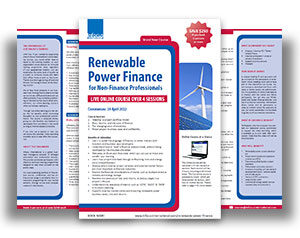Renewable Power Finance for Non-Finance Professionals (Online Course)
WHEN
TBA
WHERE
Live Online Course
Overview
This popular course is intended as a time-efficient primer for those from a non-financial background, who wish to better ‘read’ financial models & analyses presented to them, and to understand the variables which most influence renewable power project investment decisions.
Attendees will receive clear explanations of the common elements of a power project financial model, the key terminologies, and the changing economic and market context in which renewable power business plans must exist (and create financial returns).
The course will highlight the key financial inputs and outputs, without swamping those who lack a financial background in unnecessary detail or complexity. It will thus enable people from a variety of non-finance job roles – from engineering to project development to marketing – to better understand how economic and investment considerations influence, and are influenced by, their own activities.
A provided Excel cashflow model plus numerous other handouts will help with revision and cementation of learning long after the course has been completed.
Benefits of Attending
- Learn to speak the language of finance, to better interact with investors and business case developers
- Understand how to ‘read’ a financial analysis sheet, without being swamped by the minutiae and detail
- Take away an Excel cash flow sheet which you can use to revise and solidify your learning
- Learn how project risks feed through to financing costs and energy price competitiveness
- Analyse which internal project variables and external market factors are most important to financial outcomes
- Explore the financial considerations of trends such as multiple revenue streams and energy storage
- Examine the balances of risks and returns, at various stages in a project’s lifecycle
- Understand the relevance of metrics such as ‘LCOE’, ‘WACC’ & ‘DSCR’ in business planning
- Quantify how key market trends are impacting renewable power business cases, risks and returns
Live Online Course – How It Works
The structure of our virtual learning program is designed to keep the same levels of engagement and networking as our on-site public courses. Course content is delivered through our easy-to-use online learning platform and is supplemented by case studies and practical exercises.
Like our classroom-based public courses, you will have live interaction with our course facilitators and other participants. Our live online courses are led by our experienced instructors, who will provide you with easily digestible content, using knowledge learned from many years in the industry, during scheduled times. Delegates will receive copies of the course materials electronically.
This course is scheduled to take place over 4 live online sessions using virtual learning technology.
Course Agenda
Session 1: 20 April 2022, 7am – 10am GMT+0
‘Reading’ a project cashflow model
- Fundamentals of the business case: the key cost and revenue variables
- Cost structures including capex, opex, fixed & variable cost contributors
- Contrasting cost structures between different power project types
- Introducing and understanding the structure of the cashflow sheet: using an Excel model (provided)
- ‘Granularity’ considerations in the financial analysis: how much detail is useful?
- The ‘cashflow waterfall’: what it is and why it matters
- Defining commonly used financial terminology (IRR, NPV, EBITDA, DSCR, etc.)
- A glossary of key economics and financial terms (provided)
- Key timeframes, including PPA period, debt tenor and project lifetime: illustrating the impact of the chosen financial analysis period
- Common policy supports and their financial influence
- Illustrating the impact of key policies such as those around prices, emissions, taxes & depreciation
Session 2: 21 April 2022, 7am – 10am GMT+0
Risks, returns, and the costs of finance
- The importance of understanding different financial motivations and objectives: sources of finance for renewable power projects
- Debt, equity and debt/equity ratios
- Examples to illustrate where and how both financing structure and cost impact the cashflow model
- Investors’ risk/reward expectations
- The use of discount rates, target returns and ‘WACC’ in financial analysis
- The project lifecycle and financial risk: examples linking risk/return to development, construction and operational processes
- Sources of risk in energy production and capacity factor: where finance meets ‘the weather’ (and other risk factors)
- Understanding resource uncertainty and its application to the financial model: quantifying the financial impacts of P50 vs. P90 energy forecasts
- Connecting resource assessment uncertainty to debt sizing and leverage
- Other, external and market-based revenue risks
- Unpacking the factors in creating ‘bankability’ (checklist provided)
Session 3: 26 April 2022, 7am – 10am GMT+0
The changing value of electricity
- Demand, marginal supply costs and merit order curves (a dynamic, graphical illustration)
- The impact of renewable power on electricity market prices
- Revenue risks, including value erosion, negative pricing and curtailment: market examples
- Day-ahead vs. intraday markets, including market price volatility
- Channels to market and pricing considerations: trade-offs, including price vs. revenue assurance
- Understanding the limitations and applications of LCOE (levelised cost of energy)
- Comparing different methods for calculating LCOE: using the cashflow model vs. simple calculators (provided, in Excel)
- Is LCOE still a relevant metric in today’s electricity economics?
- Assessing the value of capacity and flexibility: revenue opportunities (and risks)
- The financial case for revenue stacking and multi-product approaches: using the financial model to illustrate risks vs. rewards
- What and who is driving the emergence of new renewable power business models?
Session 4: 27 April 2022, 7am – 10am GMT+0
Power project business cases and profitability
- Sensitivity analysis: revisiting the financial model and its key inputs
- The strengths and limitations of simple vs. complex financial models (which to use, when and why)
- The myth of ‘independent variables’: how multiple factors combine to determine competitive energy prices
- Example exercise: achieving lowest price bids in competitive auctions
- Additional considerations around ‘installed cost’ and ‘overnight cost’, including definitions and future forecasts (examples)
- Multiple revenue streams, including PPAs, merchant projects, capacity payments and environmental attributes
- Future considerations around refinancing, repowering and/or project augmentation: how the financial model can guide decisions
- Residual value and decommissioning costs: how do they impact the business case?
- Considerations & complexity around assessing the value-add of energy storage: worked examples
- Global vs. local business case variables, including country risk factors
- A financial risk register checklist for renewable power project developers (take away summary provided)
Training Methodology
The agenda will combine presented materials with plenty of opportunity for Q&A, interactive discussions, and the use of quantitative models to illustrate key learning points. Current market examples and data are utilised wherever helpful.

Pre-Course Questionnaire
We would like to customise the workshop based on your specific needs. Pre-Course Questionnaire will be sent prior to the workshop for analyse in advance and to be addressed during the course.

Course Certificate
Upon the successful completion of this course, you will receive a Certificate of Completion bearing the signatures from both the Course Director and the Course Organiser. This Certificate will testify your endeavour and serve towards your professional advancement.
Who Will Attend
- Renewable power project developers
- Power plant owners and operators (utilities and IPPs)
- Transmission/Distribution system operators
- Policymakers and policy advisors
- Investors, including commercial and development banks, venture capital and private equity
- Vendors & EPC contractors
- Large energy users
- Commercial energy-sector service suppliers (law, insurance etc.)
You Might Also Be Interested In
Renewable Energy Project Finance & Financial Modelling
Techniques & models for bankable green energy transactions of solar, wind, hydro, biomass & geothermal power investments in today’s competitive energy markets
Commences: 13 September 2022
Renewable Energy Power Purchase Agreements (Online Course)
Practical models and techniques for analyzing & structuring, drafting, and negotiating Renewable Energy PPAs for bankable green investments in today’s competitive energy markets
Commences: 11 October 2022
Project Finance & Project Financial Modelling (Online Course)
Project finance and financial modelling best practices with practical case studies







